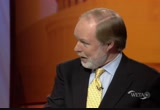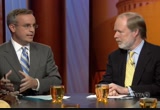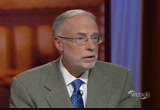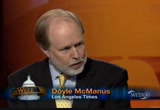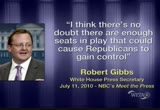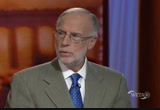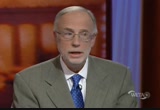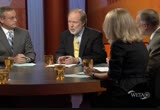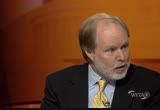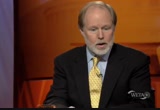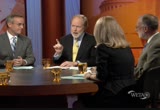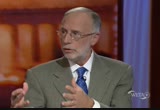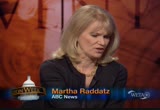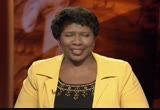tv Washington Week PBS July 17, 2010 6:30pm-7:00pm EDT
6:30 pm
gwen: wall street reform passes, but other problems remain, not least of them afghanistan. can we turn the corner? we explore that tonight on "washington week. >> the yeas are 60. the nays are 39. it is agreed to. >> victory for the democrats on wall street reform. >> no longer with kek -- recklessness on wall street cause pain for the many on main street. gwen: but is it making anybody feel belter? no victory seems to last for long. >> i won't be satisfied as long
6:31 pm
as even one person who needs eau job and can't find work. gwen: that success is elusive. as elusive as success in afghanistan agent. the good news always eclipsed by the bad. but why? covering many -- the week -- eamon javers of cnbc. dan balz of the washington post. doyle mcmanus of the los angeles times. and martha raddatz of abc news. >> award-winning reporting and analysis, covering history as it happens. live from our nation's capital, this is "washington week with gwen ifill," produced in association with "national journal. corporate funding for "washington week" is provided by >> we know why we're here. to connect our forces to what they need when they need it. >> to help troops see danger before it sees them.
6:32 pm
>> to answer the call of the brave and bring them safely home. >> around the glow, the people of boeing are working together to support and protect all who serve. >> that's why we're here. >> additional funding for "washington week" is provided by exxon mobil. the ethics and excellence in journalism foundation. the annenberg foundation. the corporation for public broadcasting. and by contributions to your pbs station from viewers like you. thank you. once again, live from washington, moderator gwen ifill. gwen: good evening. first, to the good news. the oil well in the gulf is capped. for now. and after weeks of vote trading and nose counting, congress
6:33 pm
this week passed what the white house calls its wall street reform bill. republicans, most of whom voted against it, say it's a disaster. >> i think the financial reform bill is ill-conceived. i think it's going to make credit harder for the american people to get. clearly harder for businesses to get and the fact that it's going to punish every banker in america for the sins of a few on wall street i think is unwise. gwen:democrats, most of whom voted for it, predict it will tame wall street and turn the economy around. >> what members of both parties realize is that we can't allow a financial crisis like this one that we just kent -- went through to happen again. this reform will prevent that from happening. gwen:as often happens, both sides may be overstating the new law's impact or lack
6:34 pm
thereof. eamon? >> what's fascinating to me was the way there were two separate dibets going on, one a substantive debate about the derivatives and the role of wall street and the other in which people were just throwing rocks alt each other, democrats and republicans, each trying to position themselves for the fall elections. is so you had to make this very complicated policy in the middle of this when the sides can't get along at all. it came down to the 60 votes, the bare minimum they needed but they got it this week. gwen: when nancy pelosi says now everything is going to be better, is it a bit of a reach? >> it is going to be a reach. it's not hard to see a link,
6:35 pm
though, between passing this bill and giving policy makers in washington the tools they need to do something productive the next time we have one of these crieses. it's also very controversial about whether this is going to do enough to prevent the next crisis. democrats and the president say it will but a lot of folks say it doesn't really change wall street in really bracing, fundamental ways and therefore it gives them the tools to clean up after the next mess but not necessarily prevent it. >> eamon, can you pick it apart? ha will be the most helpful? the council of regulators to watch the threat? what might really work? >> the systemic regulation council is very important because it puts concern people, certain cops on the beat so to say, saying you have to watch the mole economic system, not just your little corner as we had before. so presumably that's a good
6:36 pm
thing and helpful. but if you talk to people in the administration they will tell you the main thing it does is give them resolution authority. the government, if we get another lehman or bear stearns, teetering on collapse, the government could take it over and keep tay -- a small problem with -- from turning into something really big and druzz -- dangerous. >> what did the democrats have to give up to do it? >> it's amazing how it, so much came down scott brown, the republican from massachusetts. he was the key here and you will not be shocked to learn that there were certain massachusetts-based financial institutions that got exactly what they wanted in this bill because scott brown's vote made the difference. gwen: like what did they get? >> well, state street was one.
6:37 pm
fidelity was another. they did not want it to be designed based on a dollar amount but on how risky the firm's behavior was because they thought that that would exempt them from that new level of regulation. they wanted to be outside that scope. that's something scott brown was able to do for them, delimple the democrats let him do that for his home state firms and in turn they said now we've got to have your vote and they finally got it. brown really held out until the last minute. >> so when we had the cornhusker kickback on health care, this can -- is what, the boston bonus? >> brown's office is very sensitive about that concern and they point out that well, this does benefit fidelity but also a whole group of banks in that class and therefore it's not a carveout for anybody in particular and they say what scott brown was really concerned about was making sure the types of things that caused this crisis in the first place
6:38 pm
got more regulation, not fidelity, which was largely abbent -- absent from the crisis. gwen: -- gwen: it's a 2,300 page bill. >> chamber of commerce said there are 530 new laws that have to be written, or rewritten because of this. the fight noum shifts from capitol hill to the regulatory agencies and that's better ground for them because they can go in where there aren't tv cameras, the mill heat and light, and make their cases behind closed doors. the wall street lobbyists are convinced they can make some changes here. gwen: and the wall street lobbyists will remain employed, as they always do. and every day seems to bring a new poll that causes the white house heartburn, especially as the fall midterm elections approach. here's what the white house
6:39 pm
really worries about. president obama's overall approval rating has dipped to 50%, part of a steady, months-long side. more than half of those polled, 54%, disapprove of the president's handling of the economy. and the number of americans who say they have confidence in the president for the future has dropped 18 points since he was inaugurated, from 61% to 43%. how troubling is this for the president, dan? all those internal numbers? >> well, it's very troubling, and you could see the reaction among democrats around town this week when they saw those numbers. this is from the post and -- "washington post" abc news poll. it's not strikingly different than we have seeing and frankly other polls have president obama's approval rating at an even lower level, 46%, 44%. so the raw numbers tell part of the story, but i think one of the things that was important about this was there have -- had been for a few weeks or months, six weeks, that, some case that they might be turning things around.
6:40 pm
after he signed health care the april jobs was report was somewhat better. looked like they might be turning a corner, then the gulf happened, and the last jobs report shows anemic growth. this shows a setback for him and the democrats as they look into november. the only good news they could take out was that in terms of public confidence, public confidence in congress is even lower than as -- it is in the president. >> can you pick apart the sub groups? who is he doing well with and not doing well with? >> for the white house the worrisome thing is among independents he's down under 50%. we have him athe 47%. gallup has him at 48% among independents, the lowest he's ever had them.
6:41 pm
he is not doing well mooping white voters. 40%. he's doing well with younger voters. he's over 50% there. >> and always has. >> he did very well with them in november, but they don't tend to vote in midterm elections. he's up side down. older voters, he's lower. so all the sub groups that may be critical in november he's not doing well with. >> how do you think this may go? you're a scholar of these things. >> it's a little of all that, doyle, and you can pick whichever one you want and we know that congress is more unpopular than the president, but that's almost always true. if you look at presidential approve -- approval there is a fairly direct correlation with what happens in midterm elections. presidents over 60%, for example, tend to sometimes be
6:42 pm
able to defy the historical trends. george bush, he did that. those below that number often take, their parties take a real beating in midterm elections and that's where we are now. gwen: isn't it true we saw some rather unseemly, that's a nice way of putting it, back and forth? robert gibbs says this -->> i think there's no doubt there are enough seats in play that could cause republicans to gain control. gwen: coming from a pundit, this comment is conventional wisdom, but coming from the president's spokesman, it seemed to some democrats like betrayal. it must have made people develop unhappy on capitol hill, democrats. >> it did. and it's the words of a white house spokesman. others around him have said this. david plouffe said this recently in an interview i did with him and tp got very little attention. nobody really cared.
6:43 pm
but when a white house press secretary says it, it rattles through washington. house democrats were outraged. they know they're in a tough fight. it wasn't a surprise for them. and he didn't finish the thought, which is they could take it over, but in the end they're not going to, we have ways to prevent that. and there was this tension between congress and the administration, particularly between the house and the white house, that they're more focused at the white house about 2012 re-election and less on what happens in the house. you talk to white house officials they say that's not the case at all the gwen: look at al -- all the campaigning we've done, the money we've race -- raised. >> right. that's all out there. >> so what does president obama have to do to mend the faces? does eff to -- to hit the campaign trail for them? or rein in gibbs?
6:44 pm
>> one is he has to get out there and make the case. he has started to recently. his trips to nevada and missouri he started to frame the election in the way they want, that this is a choice, not a referendum. but the house democratic leadership was pretty strategic during this week and got further commitments for more visits. they're getting a fair amount of money. the three national party committees are getting $25 million from the d.n.c. to help, so there is stuff they're doing but they've got to do more. >> there's horse trading in washington? gwen: yeah. so let's go back a bit. often overlooked in the back and forth over the economy is the sound of dominoes falling far from washington. that's what happens when chronic joblessness, slumping home values, and overall anxiety have a long-term effect on society as a whole. perhaps that's why the president doesn't seem to get the credit, even when he wins? doyle? >> i think it's a big part of
6:45 pm
the victory, gwen. the poll numbers aren't the only ones giving him heartburn. unemployment still around 9%, likely to stay at 8.5% next year, the numbers say. and those numbers have obvious effect. when unemployment goes up, home foreclosures go up, whole communities suffer, state tax revenues go down, but there are some things that aren't quite so obvious that go beyond that. one is that when the economy goes down, the birth rate drops. families decide that this is not the time to get bigger and that's especially the case in places where mortgage foreclosures are high. in plice -- places like california, arizona, florida, those places the birth rate has really taken a drop and those kids that didn't get born this year, they're not going to be there for 90 years to come. and rates go up of depression
6:46 pm
and not just depression but suicide rates. we don't have statistics this time, i'm just reasoning from history there. and perhaps participation in community organizations and community activities goes down. people go to social clubs less. they join volunteer organizations less. there are even cases where church attendance goes down. so the social bonds that keep a community together get weaker. this all cowboys to make people very pessimistic and very grouchy. gwen: i wonder if people volt less? they see that as a form of civic -- civic participation and why bother? >> well, a lot depends on what candidates are running and how much enthusiasm, etc., but yeah, people vote less for the same reasons they engage in civic behavior less. the one group that may be
6:47 pm
booming this year is the tea party movement and that's because they're so angry. >> does this play out better or worse for any particular political party or is it a wash across the board? gwen: you mentioned the tea party, which is largely republican. they're energized. >> it's hard to draw a one to one correlation to how people are going to vote, although obviously what people are pessimistic about life in general as they are, when they're angry or disheartened about the economy, that makes them angry ands -- and it's an anti-incumbent year. same thing happened to ronald reagan in 1982. this has been an interesting recession because it's hit different groups in different ways. unemployment is longer term. people are staying out of work twice as long as in the last recession and there's been this huge drop in household wealth,
6:48 pm
in savings and 401k's. who has that hit? i'm very sorry to report that it's hit the middle-aged generation you are looking at on your screen. gwen: i don't know what you're talking about [laughter] >> interestingly, elderly people have come out pretty well. they've got their investments and pensioned. younger people have been hit terribly in the job market but have their whole lives ahead of them. the group that's turned the most pessimistic as a shift has been baby boomers, the people who are going to retire over the next 10 years. >> doyle, what turns this around? obviously when things get better it turns around, but does it take longer to lose the depression they're suffering, to get back into community groups and -- how long does that take? >> when the economy recovers, consumer spending turns around
6:49 pm
and people start buying cars ands washing machines again but a sociologist in wisconsin has study this and says being unemployed once in your life reduces your optimism for 20 years after jards. there's a real scar there. >> and there are all these things the government tries to do to stimulate growth but there doesn't seem to be anything out there for people suffering in these ways. ? there is no program. in fact, mental health budgets go down in a recession. we're doing the wrong thing countercyclely. you have to wait for the long term of a new generation, the optimistic 20 and 30-year-olds to come along and lift the community spirits. that happened after the depression and it's going to happen after this one.
6:50 pm
gwen: thanks, doyle. i really liked that sorry you wrote this week. so as americans sort out domestic woes, the war in afghanistan continues apace with record casualties among nato and afghan forces, but general david petraeus' arrival on the scene merits a second look. that's what martha did when she returned to the front lines last week for a new assessment. how many times have you been there now? >> i can't keep track. gwen: i can't either. what did you see? gwen: >> well, every place i went they're trying very hard. trying hard at the training, trying very hard to cut down casualties. trying very hard to reach out to the villagers. each piece of the puzzle is doing well but i don't know how it fits together yet and i think there's a real sense over there that if you threw that puzzle up in the air it would land in the same place you started. that was upsetting. what was more troubling was the
6:51 pm
casualties. i spent time with some para-rescuers from the air force force and got some first hand sights and thoughts of the casualties. certainly june was the deadliest move the war. july is on track to be even more so. but it's the wounded that really got me. there have been more wounded in the next -- first six months or bo the -- about the same number of wounded in the first six months than in the entire year last year. gwen: this is u.s. forces we're talking about? >> yes. u.s. forces, casualties. i went with a general and one of the first things we did is went to a memorial service for a 20-year-old soldier and i couldn't help sitting there thinking, a 20-year-old soldier who was 11 years old when this war started. gwen: wow. >> so saw that really first hand. >> is there anything you saw in the training, so much of this
6:52 pm
depends on the ability to stand up this very wobbley afghan force. was there any good in the training you saw there? >> yeah. i have the comparison to iraq so i can look back and think they've really come a long way in what they're doing and how they're doing it. but at the same time some of the are you -- recruits they're getting, one of the officers said to me they can't shoot, they can't drive, they can't read. they were doing the most rudimentary training you can ever do. driver's training the they can't read license plate numbers if they're going out to be police officers in the local areas. i think the training is going well. it's just that we're so far behind because everybody took their eye off the ball. >> the other big missing link that every in washington talks about is the effectiveness, legitimacy, corruption of the afghan government, the
6:53 pm
relationship with hamid karzai. any sign of progress there? >> certainly since david petraeus took over, that was july 4, i was there for the assumption of command. that's something he's really going to push. i think he's really just putting his head down and trying to figure out what to do next. he has melt with hamid karzai several times -- met with hamid karzai several times. he wants the local neighborhoods to defend themselves. karzai said he didn't like the idea unless the government can have some control over that. they worked out some way to do that. that means you're going to have a lot more special operations forces, more americans going out into the villages, being more vulnerable and having more casualties, to try to reach out to the elders and the villagers to defend themselves against
6:54 pm
the taliban. afghanistan is so vast. you can't really have a central government over all these areas and know what is going on. that's part of the plan, to have the different tribes -- this is very complicated, very different from iraq when it was the sunnis and so on -- this isn't "west side story." you've got a whole lot of afghan tribes. >> is there a time table in year -- we're a year away from july 11, 2011. >> from when we're leaving? i think there is so much skepticism will -- about that. you have heard it from president obama in the last weeks. "we're not closing the doors and turning out the lights," he wants to assure them. but there's a cap of 30,000 on american troops and what i saw on the ground is an enormous number of contractors. so in some ways i think you are
6:55 pm
having contractors come in there to do things american troops wouldn't. it seemed there was a lot of transport being done by contractors so they can hold the nucks of american troops down but there are zeros and ones going on all the time there. gwen: sounds like it's privatizing the war almost. >> in some ways. but it started in iraq. gwen: sounds like more this time. thank you, martha. and thanks everybody else as well. we're done here, but the conference continues online. check out our "washington week" webcast and my new blog and twitter feed at pbs.org/washington week. i don't know how i feel about that yet, but check it out. then keep up with daily developments at the pbs newshour. and we'll see you right here around the table next week on "washington week. good night. captioned by the national captioning institute
6:56 pm
--www.ncicap.org-- >> download our weekly podcast and take us with you. at "washington week" on line at pbs.org. >> "washington week" was produced by weta, which is solely responsible for its content. additional corporate funding for "washington week" is provided by -- boeing. exxon mobil. the ethics and excellence in journalism foundation. the annenberg foundation. the corporation for public broadcasting. and by contributions to yourpbs station from viewers like you. station from viewers like you. th
219 Views
IN COLLECTIONS
WETA (PBS) Television Archive
Television Archive  Television Archive News Search Service
Television Archive News Search Service 
Uploaded by TV Archive on

 Live Music Archive
Live Music Archive Librivox Free Audio
Librivox Free Audio Metropolitan Museum
Metropolitan Museum Cleveland Museum of Art
Cleveland Museum of Art Internet Arcade
Internet Arcade Console Living Room
Console Living Room Books to Borrow
Books to Borrow Open Library
Open Library TV News
TV News Understanding 9/11
Understanding 9/11






